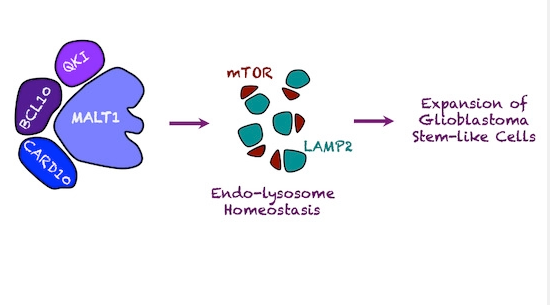
Researchers find new indication for cancer drug
French researchers have found MALT1 blockers not only to act on blood cancers but also to be effective as a treatment for glioblastoma.
Julie Gavard and colleagues at the University of Nantes identified a new druggable target against glioblastoma, the most common and lethal type of brain tumour, using the innovative concept of non-oncogene addiction for screening. Non-oncogene addiction relies on the fact that cancer cells become strongly dependent on normal genes and cell functions for survival during disease progression and to target these genes to block tumour growth more efficiently. Blocking the MALT1 gene, for example causes lymphoma cells to die.
Gavard and colleagues now addressed the role of MALT1 in glioblastoma. Data from The Cancer Genome Atlas, a molecular characterization of more than 20,000 primary cancers, indicated that low MALT1 levels strictly correlated with patients’ survival in brain cancer. Adding MALT1 blockers to cell cultures of glioblastoma stem cells, caused the self-renewing tumour cells to undergo a rare form of cellular suicide termed lysosomal cell death. In further analyses, it turned out that MALT1 keeps lysosomes low in cancer cells, which is crucial for their survival. In contrast, both, blocking MALT1 genetically and pharmacologically led to an increase in lysosomes, which in turn impaired the cells’ waste disposal system, eventually killing them. The findings in cell culture have already be validated in animal models.
However, MALT1 blockers such as the former tranquilizer mepazine, a drug of the 1960ies, have shown adverse side effects. Even though, development activity of MALT-1 inhibitors have been revived. Janssen Research & Development, LLC is in Phase I testing of a MALT1 blocker code-named JNJ-67856633 in Non-Hodgin lymphoma.
Gavard and colleagues recommend development of repurposed MALT-1 blockers to treat glioblastoma.
www.embopress.org/doi/10.15252/embj.2019102030


 Sitryx Therapeutics
Sitryx Therapeutics
